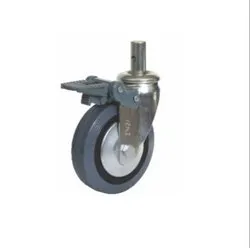
Products
Services
Applications

Trolleys or Tractors, which we may have seen used at airports, warehouses, factories, and many other production plants, are known for carrying objects from one location to another; nevertheless, their top speed is 10 kmph for safety reasons.But even at this slow speed, both the wheels and the castors can suffer severe impacts from uneven surfaces. The wheel and castors that are selected must be capable of supporting this. Outdoor use can be even more harmful.
HOW TO TOW: Tractive force can come from either fixed track chain towing or free movement tractors. FIXED TRACK TOWING: This is of two types: 1) Under floor systems. 2) Overhead conveyors. Both systems travel at slow speed, over fixed pathways, which are smooth. As a result, these systems do not have a problem with large impact. To prevent wheel failure, which might result in unattended trolleys being dragged around and damaged, frequent maintenance is crucial.
TRACTORS (FREE MOVING): There are various types available – electric, petrol, diesel- and all allow much greater flexibility. The flexibility of using tractors to pull one or more trolleys has various benefits. But they do mean that wheel and castors are often pulled at quite high speed over unsmooth surfaces, and can hit grates, rails, weather lips at doors, etc. Therefore, powder towing castors need to be very strong. The rougher the use, the larger the wheel.
FLOORS/SURFACES & CASTORS: Tyre type: In theory, a wheel transfers its load to a hard floor along a line of contact. However, in practice, this is an elongated area which is Narrow fore Cast Iron Wheel, Wide for Polyurethane Wheels and Widest for Rubber Wheels. On the smooth hard surface, a hard cast iron wheel with a narrow contact area may roll more easily-BUT its unit load will be very high. The unit load (crushing pressure) is the total load divided by the area of contact. If this pressure is too high, it will damage the floor. In practice, the crushing pressure of the cast iron wheel will often exceed the compressive strength of concrete, particularly when the load is further concentrated at expansion gaps, cracks, etc., or when the loads are increased by speed and inertia.
In fact, cast iron recommends them for towed use. Polyurethane spreads the load sufficiently to avoid damage to floors without a large increase in the ‘push’ necessary. Being extremely resilient and resistant to abrasion makes it the ideal trying material. Additionally, it softens the weight and protects the trolley and castor from harm. Any warehouse or factory's concrete floor is likely the most expensive component in there, thus it has to be safeguarded from harm by using the proper REXELLO CASTORS & WHEELS.The use of Rubber is less or little because it is too hard to push at high loadings, it can get adversely affected by oils, chemicals, etc., and it lasts only 1/5 (or less) the life of polyurethane.